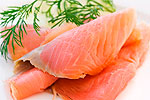 A new study has found that omega-3 fatty acids, one of the most healthful substances to humans, may limit the damage from a stroke. This fatty acid, found within many fish, was discovered to reduce the severity of brain damage after a stroke.
A new study has found that omega-3 fatty acids, one of the most healthful substances to humans, may limit the damage from a stroke. This fatty acid, found within many fish, was discovered to reduce the severity of brain damage after a stroke.
This bit of health news comes courtesy of Laval University in Quebec, Canada, from information gleaned from mice. It showed that the extent of brain damage following a stroke was reduced by 25% in mice that consumed docosahexaenoic acid (a potent form of omega-3s), or DHA, daily. It was published online in the journal “Stroke.”
Researchers observed that the effects of stroke were less severe in mice that had been fed a diet rich in DHA for three months than in mice fed a control diet. In mice from the DHA group, they saw a reduction in the concentrations of molecules that trigger inflammation. Conversely, they saw a larger quantity of molecules that prevent the activation of cell death.
The researchers call this the “first convincing demonstration” of how powerful DHA is in protecting the brain from inflammation. Basically, DHA partially replaces arachidonic acid, an omega-6 fatty acid known to actually increase inflammation.
Eating omega-3s creates an anti-inflammatory and brain-protective environment that mitigates damage following a stroke. And the researchers believe this effect is likely the same in humans. They conclude: “Since DHA is readily available, inexpensive, and reduces the risk of a number of health problems without causing significant side effects, the risk-benefit ratio tends to favor the regular consumption of fish or DHA.”
Just another big score for fish mongers everywhere.
